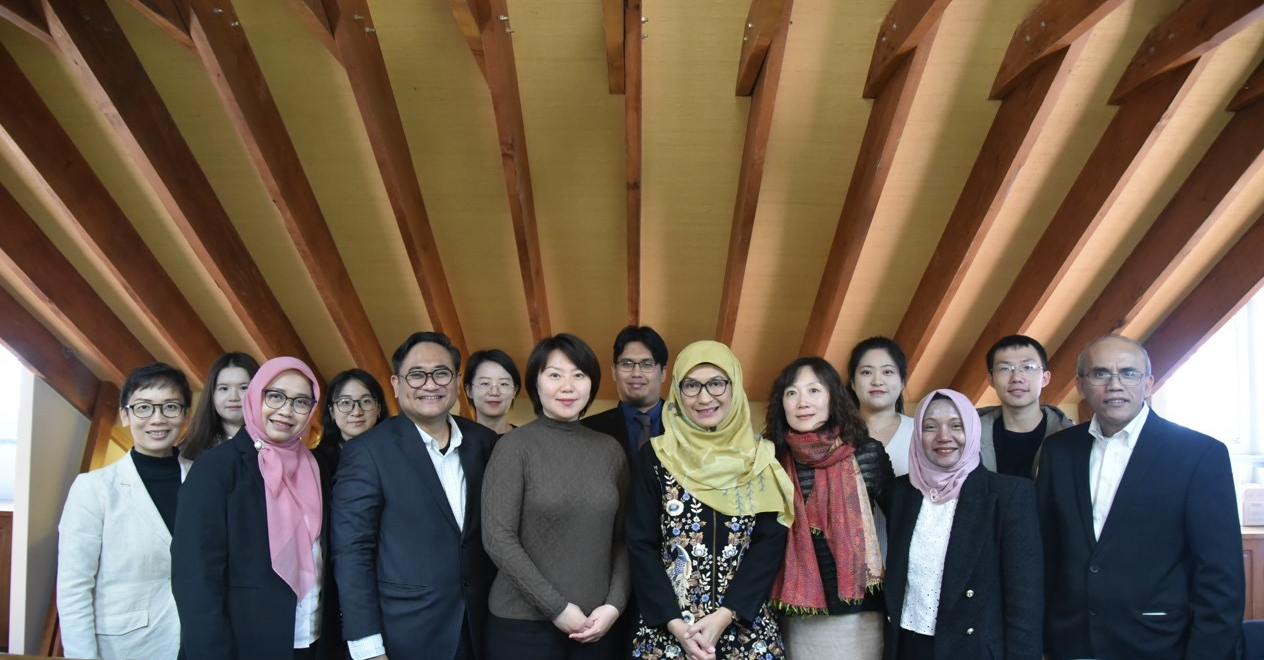
The Institute of Area Studies, Peking University (PKUIAS) held its 11th lecture of the “Adventus Amicorum” series on November 14. The event invited the eight core members of Bank Indonesia’s Senior Executive Service Program (SESPIBI) to participate.
The lecture was introduced by Kong Tao, a senior research fellow at the Institute of Digital Finance and an associate research fellow at PKU’s Institute of Social Science Surveys. Yu Jia, senior operations officer and director of the International Development Cooperation Department, Institute for New Structural Economics; and Hu Jiayin, assistant professor at the National School of Development as well as PhD students from several departments participated in the discussion.
Agustina Dharmayanti introduced the Indonesian participants and expressed the group’s desire to learn from China’s rapid development of the digital economy.
Yu Jia discussed in detail “China’s Macroeconomy and its Role in International Economic Cooperation”. She elaborated on China’s 40 years of modernization since 1980, especially the acceleration of economic growth after its accession to the World Trade Organization (WTO). From the perspective of new structural economics, she analyzed the impact of market mechanisms, the role of government, entrepreneurship and continuous innovation in the development process, and discussed China’s “double cycle” development strategy in the face of the new challenges of globalization.
Hu Jiayin introduced the role of mobile payments in China’s digital financial development, particularly the multifaceted services of digital payment platforms such as Alipay, including online and offline payments, as well as personal loans, credit, investment and insurance. She emphasized the role of digital payments in reducing transaction costs, solving trust issues for remote and small transactions, and providing information on transactions and cash flows, with particular benefits for small- and medium-sized enterprises (SMEs). The impact of digital payments on traditional banks and their role in creating networks and ecosystems and interacting with central banks were also explored.
Kong Tao described the relationship between the platform economy, digital payments and social inclusion, particularly the impact of digital platforms on micro and small enterprises (MSEs). Focusing on the size of China’s digital economy, Internet penetration and e-commerce development, she highlighted the significant positive impact that digital platforms like Alipay have had on MSEs, especially women operators, by reducing transaction costs and increasing the efficiency of market contact.
During the discussion session, the members of the Bank Indonesia delegation asked questions about Chinese government’s strategy to cope with economic risks and avoid economic crises, its search for a new path of industrial and economic development as a large country, and the role of the Chinese government in economic development. Yu Jia responded to each of these questions.
In the concluding session, Kong Tao emphasized the important role of the digital economy in China, which not only promoted economic growth and created many jobs, but also brought great convenience to consumers and promoted the development of traditional industries. In particular, she pointed out that digital transformation was crucial for established industrial enterprises, and that this process played an important role in integrating urban and rural development as well as improving international competitiveness. In addition, the challenges faced by countries at different stages of development were different, so the sharing of experiences, both successes and failures, was extremely valuable. She hoped that the seminar would lay a solid foundation for more in-depth discussions and exchanges in the future.


